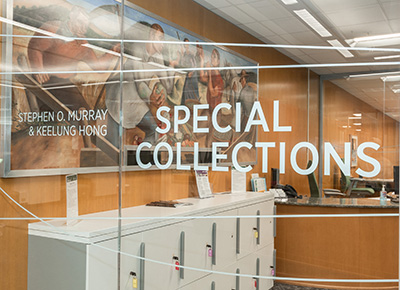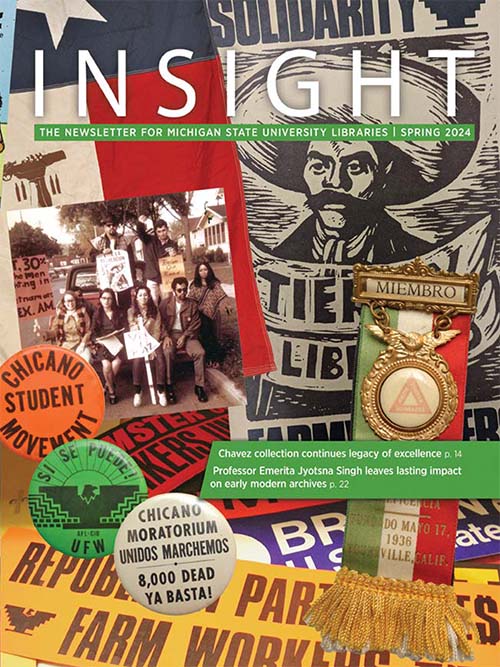-
May 16, 2024 12:00 PM – 1:00 PM
Special Collections Seminar Room (Main Library,1 West)
Brianna Anderson, Georgia Institute of Technology
MSU Libraries Visiting Scholars Presentations Summer 2024
Eight researchers from outside MSU have been awarded visiting scholar grants from Michigan State University Libraries' Visiting Scholars program for summer 2024. During their week of residence, each will give a presentation about their ongoing research and collections at MSU they have found valuable.
-
May 23, 2024 12:00 PM – 1:00 PM
Special Collections Seminar Room (Main Library,1 West)
Jose Guerrero, Berkeley Public Library
Eight researchers from outside MSU have been awarded visiting scholar grants from Michigan State University Libraries' Visiting Scholars program for summer 2024. During their week of residence, each will give a presentation about their ongoing research and collections at MSU they have found valuable.
-
June 06, 2024 12:00 PM – 1:00 PM
Special Collections Seminar Room (Main Library,1 West)
Jason Farman, University of Maryland
MSU Libraries Visiting Scholars Presentations Summer 2024
Eight researchers from outside MSU have been awarded visiting scholar grants from Michigan State University Libraries' Visiting Scholars program for summer 2024. During their week of residence, each will give a presentation about their ongoing research and collections at MSU they have found valuable.
View all Events & Workshops
-
Welcome! I hope the spring break provided a good opportunity for some rest and relaxation amid a busy semester. The MSU Libraries has also seen a lively term, and as we look ahead I wanted to take a moment to share some important updates.Spring semester hours. Regular hours following spring break resumed Monday, March 4. The MSU Libraries is typically open 24 hours per day on Monday through Thursday, with later opening and earlier closing times on the weekends. Regular hours will shift beginning with the last class day of the spring semester on Friday, April 26, as we head into our shortened summer hours. Please note that for safety and security purposes, all students, staff and faculty are required to scan their MSU ID to access the MSU Main Library building between 10:00 p.m. and 7:30 a.m. on Sunday – Thursday. A complete schedule for the Main Library hours is available here.MSU Press director appointment. In October Elizabeth Demers was appointed director of the MSU Press. Demers comes to MSU from the University of Michigan Press, where she was hired as editorial director in 2017. She also previously held positions at Johns Hopkins University Press, Quarto Publishing and Potomac Books. Demers received undergraduate degrees in English and French from MSU as well as a master’s in comparative literature. She also earned a doctorate in history at MSU. In addition to her education at MSU, she obtained a Master of Business Administration at the University of Maryland. Demers has expressed enthusiasm about the opportunity to lead MSU Press, noting that she is “thrilled to be a part of MSU Press’s tradition of outstanding scholarship and community engagement.”Harmful Language Remediation Group. The Harmful Language Remediation Working Group (HLRWG) at MSU Libraries formed in fall 2022 with the goal of identifying, assessing and responding to harmful language issues in the MSU Libraries’ descriptive metadata. The primary role of the HLRWG is to facilitate and track harmful language remediation projects across the MSU Libraries. The group has recently developed a publicly available form that can be used to report instances of potentially harmful language in the MSU Libraries catalog. This form is available here.Building construction. In August 2022 the Libraries began working in partnership with brightspot strategy to reimagine our spaces and services to be more responsive to current and future needs of our faculty, staff and students. Several phases have already been completed while others have seen significant progress. Our new MSU Libraries Starbucks opened at the beginning of the spring semester, with updated seating in the café area as well as an option for mobile ordering, and the reconfiguration of 2-West is now also complete and home to the MSU Center for Teaching and Learning Innovation and the Office of Faculty and Academic Staff Development. Construction on 3-East to relocate our Stephen O. Murray and Keelung Hong Special Collections is progressing with plans to install shelving in April; this project phase is expected to continue into Fall 2024. Ongoing updates are available on our website at lib.msu.edu.We are looking forward to supporting your learning and research needs as we approach the end of the spring semester (and beyond!). As a reminder, if you are unable to find an answer on our website or would like to speak to someone in person, we are available at our information desks as well as by phone at (517) 353-8700.With warm wishes for a productive semester,Neil Romanosky, Ph.D. Dean of LibrariesView All News Articles

-
The MSU Libraries’ Spring 2024 issue of Insight is now available! This edition features stories on the establishment and legacy of our Cesar E. Chavez Collection, the lasting impact of Professor Emerita Jyotsna G. Singh’s endowment for our early modern collections, the launch of recent digital initiatives including the open access Turfgrass Information File database and the work of the Harmful Language Remediation Working Group in addressing harmful language within the Libraries’ public catalog and other resource descriptions on campus, and more!
-
In August, the MSU Libraries Stephen O. Murray & Keelung Hong Special Collections will begin the process of relocating to the third floor of the Main Library’s East Wing. While this is an exciting phase of growth in the Libraries’ transformative reimagination plan, we will also need to put several services on pause to accommodate the move. Access to our Special Collections will be closed for about 12 weeks beginning mid-August, which especially impacts faculty who use these materials for research as well as classes that use these materials for instruction.Beginning Aug. 15:• The MSU Libraries’ Reading Room will be closed.• Special Collections instruction and programming will be put on hold.• Interlibrary loans for Special Collections will be unavailable. The Main Library’s 3-East is also undergoing renovations to have climate control and a fire suppression system installed to protect our valuable collection materials. Currently located in the basement of the Main Library, the Special Collections holds over 500,000 printed works, numerous manuscript and archival collections, and an extensive collection of ephemera. The relocation will also provide the opportunity for Special Collections staff to more closely collaborate, as it will be the first time the unit is co-located, enabling further work together.Contact: Leslie McRobertsView All News Articles

View all News Articles
-
December 08, 2023 – April 30, 2024
Approximately 1.3 billion, or one in six, people experience disability worldwide (World Health Organization). Despite this high prevalence, people with disabilities have been oppressed and treated unequally and unfairly by ableist societies and systems since the beginning of history. There have, however, been many accessibility advancements and improvements, especially in technology and physical spaces, throughout time; some of which are highlighted in our exhibit.
-
A collection of early modern, English, conduct books offering helpful advice of the period on conduct, behavior, morals, values, spirituality, education, letter writing, personal relationships, and practical topics. This exhibit is about marriage advice in some of these books.
-
For over a half-century the MSU Libraries has been acquiring and building an important collection of materials devoted to early bee keeping. The Baker Collection is especially strong in apiculture works printed in English, although other languages are well represented.
View all Exhibits







